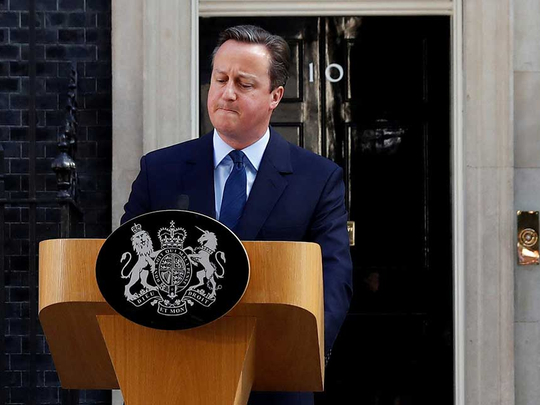
London: Britain will leave the European Union, will have a new Prime Minister in three-months’ time, has rattled global stock, currency and commodity markets, and has raised the possibility of the very break-up of the United Kingdom itself.
How did it come to this, a night and day of unprecedented political developments that has sent shock waves through Europe?
The answer lies at the feet of Prime Minister David Cameron — a man who gambled and lost on a roll of the dice that Britons would not dare take a step into the dark.
They did, by their millions, backing the ‘Leave’ side by 52 to 48 per cent. And that decision is sending shock waves across Britain and across the English Channel — all because of a vote that was opportunistic, unnecessary and meant to end anti-Europe bickering in his Conservative party once and for all.
All of the opinion polls on Wednesday and Thursday pointed to a ‘Remain’ win, with the result only increasing the sense of shock that Brits have actually voted to want out on the EU after 43 years working with Brussels.
Cameron made the pledge to hold the referendum three years ago when support for the anti-Europe UK Independence party (Ukip) was strong, and there was a growing Euro-sceptic wing in his Conservative ranks. When he won a majority government in May of 2015, there was little need to follow through on the pledge, He did, gambled — and lost.
Netherlands, France, Austria and Poland will be looking at the result — and salivating at the possibility of other ‘Leave’ votes there.
He may also have set in place a process that will lead to the break up of his own United Kingdom. Both Scottish and Northern Irish voters voted strongly in favour of remaining in the EU.
Nicola Sturgeon, the First Minister of Scotland, said the result meant that Scotland must now do what is good for Scotland — and its place was in Europe.
“The UK-wide vote to leave the European Union is one I deeply regret,” she said yesterday. “As things stand Scotland faces the prospect of being taken out of the EU against its will and I find that deeply disturbing.”
She said Scotland reserves the right to hold a second referendum and that it is on the table. In effect, an international border might exist between Scotland in the EU and England out of the EU.
She indicated that the second referendum will be held within the two years of negotiations the UK will have with Brussels.
In Northern Ireland, Sinn Fein issued a statement saying that the vote intensifies the need for a referendum on reuniting Northern Ireland with the Republic to the south.
With Cameron’s resignation, the door is now open for pro-Brexit politicians — such as former mayor of London Boris Johnson, to take the reins and the keys to 10 Downing Street. He is the favourite to win the leadership of the Conservative party and thus become Prime Minister.
But he would also likely have to call a new general election — likely another bitterly divisive campaign.
Labour Leader Jeremy Corbyn, is also facing criticism for running a lukewarm campaign for ‘Remain’, and there are reports that 50 of his parliament party members have signed a letter calling for him to resign.
Cameron called the referendum to silence the Euro-sceptic element in his party — and for no other reason. In doing so, he opened up the possibility of Brexit — and officials and political leaders in Europe were furious that he had done so.
The reality, though, is that few on the ‘Leave’ side actually believed that they could win. Shortly after the polls closed, Nigel Farage, Ukip’s leader, said he believed the ‘Remain’ side had done enough to win. He later reversed that sound bite and then boasted that June 23 should be marked as Britain’s independence day, and was urging for a quick and sharp exit from Europe.
The process of leaving Europe is allowed for under Article 50 of the Treaty of Lisbon. Once the next prime minister delivers the official intention to Brussels of the UK’s intention to invoke Article 50, there’s a two-year window to negotiate the terms of withdrawal.












